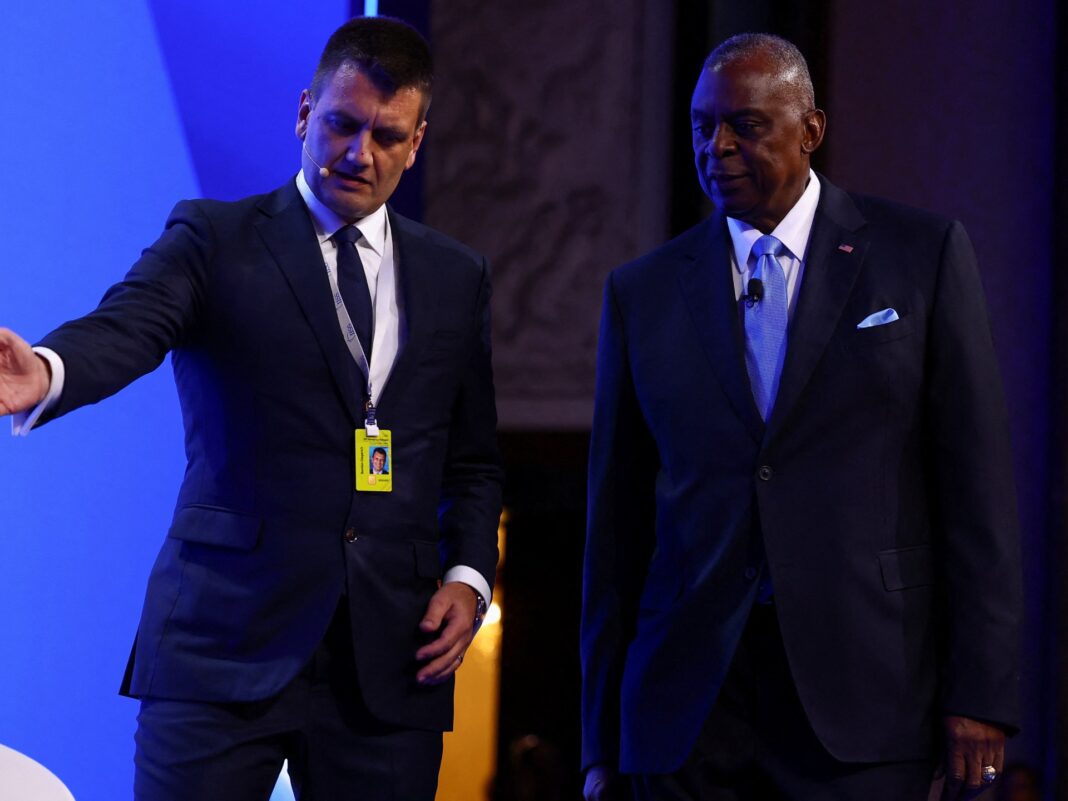Defence chief Lloyd Austin has praised a “new era of security” in the Asia Pacific as he underscored that the region remained a major strategic priority for the United States, drawing a quick pushback from a senior Chinese military official.
Austin made the statement on Saturday, a day after holding a crucial meeting in Singapore with his Chinese counterpart, Dong Jun, during which they agreed to resume military-to-military communications amid efforts to ease growing tensions between the world’s two largest economies.
China hailed Friday’s face-to-face talks and the agreement to mend fraying security ties as “stabilising”. But competition and tensions over a slew of issues – from Taiwan to the South China Sea – continue to test the resolve of both countries.
On Saturday, Austin said that in the past three years there had been a “new convergence around nearly all aspects of security” in the region, where there was a shared understanding of “the power of partnership”.
“This new convergence is producing a stronger, more resilient and more capable network of partnerships and that is defining a new era of security” in the region, Austin told the Shangri-La Dialogue in Singapore.
However, it was not “about imposing one country’s will” or “bullying or coercion”, Austin said, in an apparent shot at China, which has increased its sabre-rattling over self-ruled Taiwan and grown more confident in pressing its claims in the South China Sea.
“This new convergence is about coming together and not splitting apart,” Austin said. “It’s about the free choices of sovereign states.”
Responding to Austin, Chinese Lieutenant General Jing Jianfeng accused the US of seeking to build “an Asia Pacific version of NATO”, and described the superpower as the “greatest challenge to regional peace and stability”.
Jing said the US strategy was intended “to create division, provoke confrontation and undermine stability”.
“It only serves the selfish geopolitical interests of the US and runs counter to the trend of history and the shared aspirations of regional countries for peace, development and win-win cooperation,” said Jing, who serves as the deputy chief of the Joint Staff Department of China’s Central Military Commission.
Reporting from Singapore, Al Jazeera’s Patrick Fok said Austin left “very little doubt” that the US was trying to project its power in the region.
“That seems to provoke a response from the Chinese side,” he said, pointing out that the “acrimony has spilled out in the open”.
He added: “The message that we are getting here [is that] the US is deeply committed to the Indo-Pacific and that the US is not going anywhere.”
‘Inviting wolves’
Austin has been attempting to refocus attention on China’s actions in the Asia Pacific, as he sought to alleviate concerns that conflicts in Ukraine and Gaza have distracted from his country’s security commitments in the region.
“Despite these historic clashes in Europe and the Middle East, the Indo-Pacific has remained our priority theatre of operations,” Austin stressed.
“Let me be clear: The United States can be secure only if Asia is secure,” Austin said. “That’s why the United States has long maintained our presence in this region.”
Austin also highlighted the importance of alliances in the region, highlighting the need for “peaceful resolution of disputes through dialogue and not coercion or conflict”.
During their meeting on Friday, Austin was warned by Dong that the US should not interfere in China’s affairs with Taiwan, defence ministry spokesperson Wu Qian told reporters. China claims the democratically governed island as its own territory.
Some US officials have been warning that Beijing has become more emboldened in recent years, recently launching what it described as “punishment” drills around Taiwan.
China is also furious over the US’s deepening regional defence ties, particularly with the Philippines, and its regular deployment of warships and fighter jets in the South China Sea.
On Saturday, Austin insisted that the US’s commitment to defend the Philippines under their mutual defence treaty remained “ironclad”, as repeated confrontations between Chinese and Philippine vessels in the South China Sea have stoked fears of a wider conflict.
“America will continue to play a vital role in the Indo-Pacific, together with our friends across the region that we share and care so much about,” Austin said, describing Chinese activities in disputed waters with the Philippines as “dangerous harassment”.
Jing, the Chinese general, said these alliances only contributed to instability in the region.
“It is natural for neighbours to bicker sometimes, but we need to resolve disagreements through dialogue and consultation rather than inviting wolves into our house and playing with fire,” he said.







